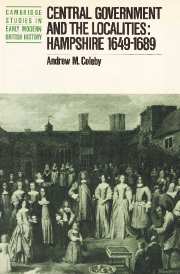INTRODUCTION AND PROLOGUE
Published online by Cambridge University Press: 14 October 2009
Summary
Historians of early modern England no longer need to apologize for devoting considerable attention to the localities. In recent decades, local studies have provided vital insights into the origins and course of the Reformation of the sixteenth century and the Civil Wars of the seventeenth. However, for some obscure reason, until recently this approach has not been extended to the decades of the seventeenth century after the restoration of Charles II in 1660. Historians already established in the field of Restoration politics have acknowledged the significance of the local dimension, but have done little to follow this up with local research. Other scholars have not been so coy and the last few years have seen the appearance of several important local studies which extend beyond the previously hallowed watershed of 1660.
However, this is the first such study to make centre–local relations rather than local administration and society its principal theme. Central involvement in the localities after the mid-century and especially after the Restoration has been widely ignored and underestimated by historians, with a resultant distortion in current views of the Restoration regime. Local reactions to central government and its policies have fared little better for the same period. The intention of this present study is to go some way towards redressing the historiographical balance.
But even while shifting to a slightly later period, it is difficult to throw off the influence of the local historians of the early Stuart period.
- Type
- Chapter
- Information
- Central Government and the LocalitiesHampshire 1649-1689, pp. 1 - 14Publisher: Cambridge University PressPrint publication year: 1987



